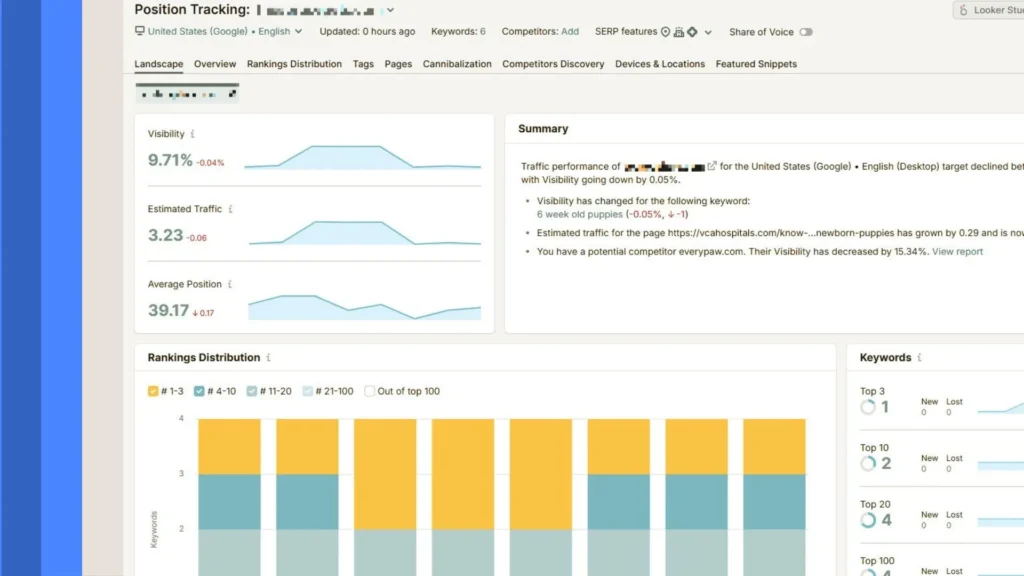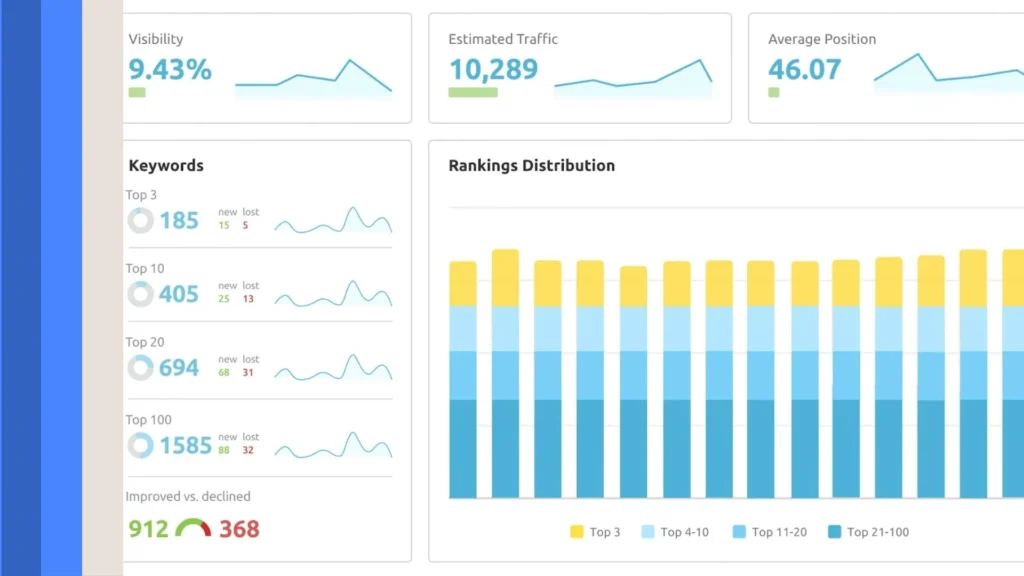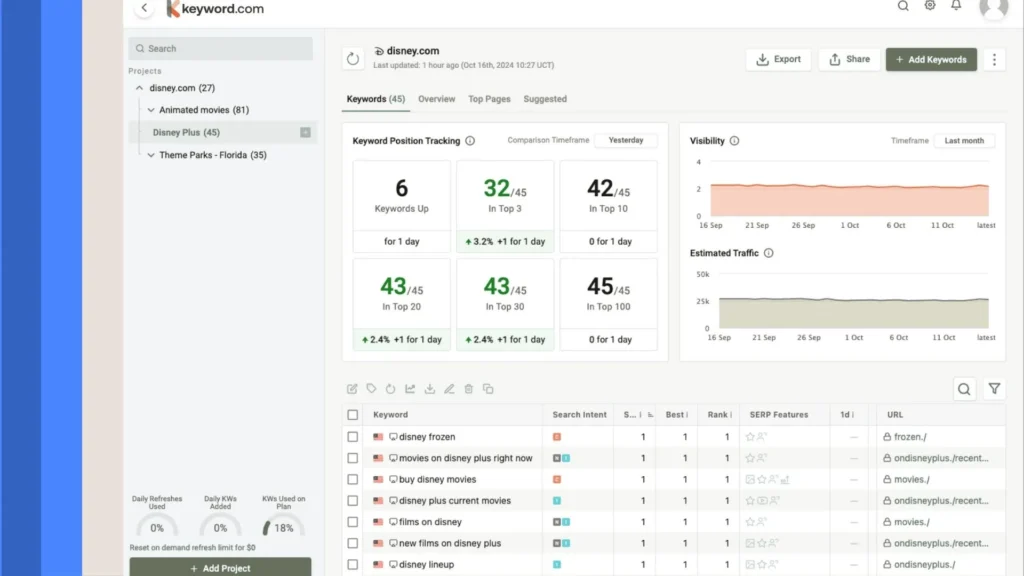In a competitive online world, being online alone is not the solution; you should also know how visible your site is to your intended customers on Google. That is the role Google position tracking plays. This is a necessary process used in SEO that enables you to track the position of your site in Google search engine through search engine result pages (SERPs) for specific search keywords.
Monitoring keywords ranking not only informs you about the strength of the chosen performance measures, but it will also enable you to determine to what extent you have potential content and competitors, as well as provide a quick response to any changes in ranking.
To anyone who is a marketer, business owner, or SEO practitioner, knowing the basics of Google position tracking, how it works, which tools they are supposed to use, and how this should be implemented can take them a long way towards enhancing their search visibility, increasing traffic and growing their business visitor base.
It will tell you all that you need to know: how to track, what the most popular tools are advanced tips on how to make your SEO go to its top.
What is Google Position Tracking?
The Google position tracking is the action of keeping an eye on the position of a web page or a site within the Google search engine listings (SERPs) concerning certain keywords over a period. It gives a clear description of the effectiveness of your content in organic search as well as its position against other competitors.
An illustrative example will be when you target the keyword, best electric bikes 2025, the Google position tracking will indicate whether your page is on position 1, 5 or even on the second page of the search engine. The data is necessary too to learn which keywords generate traffic and which ones still need optimisation.
It is not the case just with global rankings. Local SEO is something that can also be focused on Google position tracking as well as tracking your business ranking in certain cities, regions or even in zip codes. The location/device segment enables marketers to learn more about the behaviour of their target audience since the location/device can be drilled down.
Monitoring what rank your keywords have can help you react to the changes in search positions, strengthen your content strategy, and consistently stay at or above your SERP positions.

Why is Google Position Tracking Important?
The online market is highly competitive, and being in the top position on Google can play a great role in determining your success. The following is why Google monitoring of positions should be part of your SEO tactic:
1. Assess the performance of SEO
It enables you to monitor the effectiveness of your SEO campaigns over time. When you notice that your keywords are reaching new highs in terms of ranking in search results, this is a good indicator that your content optimisation, back linking, and technical seo approaches are not in vain.
2. Identify Opportunities
Checking the ranking of keywords will assist you in discovering emerging keywords. Some of the long-tail keywords might already begin to perform solidly without necessary effort, and you will be offered the opportunity to dig deeper and provide additional related content.
3. Competitor Benchmarking
With Google position tracking, you have a chance to compare your ranking with those of your competitors. You may follow the areas in which they are ahead of you and research their content or link-building tactics to employ the same.
4. Traffic Drops Diagnosis
Position tracking can assist you in identifying the problem in case your site experiences a sharp loss of traffic. It may be a plunge in the ranking status of one of your high-traffic keywords, and there is something you can do about it.
5. Facilitate Data-Driven Decisions
Keywords are tracked, and these give solid data that can be used in reporting to stakeholders or the client in SEO. This is in support of buying investments in SEO and aligning marketing strategies with performance measures.
How Does Google Position Tracking Work?
Getting to know the mechanism of Google position tracking will enable you to utilise it better. The underlying task is to scan the position of a website or a page on Google serp with a set of given keywords. It may be done manually, yet it will be quite effective when automated tools are used.
1. Keyword Input
The first one is to select the keywords you wish to monitor. Keywords can be branded keywords, product names, informational phrases, local search terms, etc. As an example, a local dentist can monitor keywords such as to dentist in Chicago or teeth whitening services nearby.
2. SERP Scraping
Monitoring applications pretend to Google all of your keywords and check the results to reveal where your site ranks. The first one encompasses the well-known 10 blue links, as well as featured snippets, video carousels, and local 3-pack.
3. Locations and Device Settings
Using the most modern tools, you can monitor positions regardless of geography (state/city or country) and device (desktop or mobile). It is particularly useful to businesses that serve local consumers or the ones whose mobile ranking is not similar to desktop.
4. Historical data storage
Your previous ranking data will be stored in these tools, and you can analyse the trends over time. It is possible to view whether the page is gaining in rankings, losing them or remaining stable.
5. Reporting and visualising
The findings are normally presented in a simple-to-read dashboard containing graphs, tables, and alerts. You have an option of monitoring ranking daily, weekly or monthly according to your plan.

Best Tools for Google Position Tracking
Several tools exist specialising in Google position monitoring. There are those that offer simple tools, and yet there are those that will give more analysis and reports. The following are the most popular SEO tools which have been used by SEO professionals:
1. Free Google Search Console (Free)
Although it is not a conventional position tracking software, Google Search Console enables you to observe mean keyword ranking, impressions and well as click-through-rates recorded directly at Google. It is more appropriate to be used together with other tools.
2. SEMrush
Position Tracking device of SEMrush provides daily updates, competition tracking, and local keyword monitoring. It is also possible to monitor featured snippet opportunities and keyword tagging into groups.
3. Ahrefs
Ahrefs Rank tracker gives you an insight into your keyword ranking, visibility score and comparison of your performance against the leading competitors. It provides large amounts of historical information and mobile/desktop stratifications.
4. Moz Pro
Moz Pro is an easy and fast way of tracking a keyword and providing actionable insights. It is awesome for smaller companies or agencies which require user-friendly interfaces.
5. Ubersuggest
It is a low-cost, Neil Patel SEO tool that gives results on keyword tracking, and other services such as the domain audit and content ideas.
6. ProRankTracker & AccuRanker
These rank-tracers are specialised in their accuracy, speed and in-depth filters.
When selecting a Google position tracking quantity of keywords you require to monitor, frequency of updates, and other features such as rival monitoring or whitelabel reporting.
How to Use Google Position Tracking Effectively
Having learned what Google positioning tracking is and which services to refer to, it is time to know how to use it strategically to develop the presence of your site.
1. Choose the best Keywords
Do not chase any keyword out there. Focus on:
- Relevant business-oriented keywords
- Keywords of good search with realistic difficulty
- There is both the short-tail and long-tail version
- This assures that you strive to attract quality traffic.
2. Keep Observation of Change
Configure your tools so as to constantly monitor the rankings on a daily or weekly basis, depending on the dynamics of your niche setting. Be on the lookout for instantaneous alteration, both positive and negative.
3. Arrange the Keywords of the group by Purpose or Subject
You can sort out your keywords by type, no matter whether they are blog content keywords, product page keywords, or even local searches. This assists you in evaluating the good and the bad parts of your site.
4. Research on Dropping of Ranks
In case of lowered ranks:
- See whether other websites outsmarted your content
- Make sure that your page is kept indexed and crawlable
- You can do the following: Update your content, improve the connecting sites or make your pages open faster
5. Utilise Winning Keywords
If a keyword is improving the rankings
- Produce a related keyword supporting content
- That page gets more authority with the internal link
- Advertise it on the social network or use email campaigns.
6. Report and Alter
A big-picture view of your progress is something you will get by reporting regularly. Make charts and graphs to see the difference over time and modify your strategy based on the given information.

Bonus Tips for Better Google Position Tracking
- Track competitors: Add in competitor domains where they appear higher than you and why.
- Use Alerts: Configure alerts for major changes in positions.
- Keep an eye on SERP Features: This allows you to understand whether your materials appear in rich snippets or the People Also Ask section by Google.
- Mobile-First Method: Has to track mobile rankings – Google uses a mobile-first method.
Conclusion
One of the most useful undertakings in search engine optimisation is that of Google position tracking. It enables you to check the outcome of your work on SEO, to find out the trend of changes, to keep up with competitors, and to reveal new ways to develop.
With the help of the tools which are reliable, monitoring the correct keywords, and reacting readily to the alterations, it is possible to manage the presence in Google and make certain that your site is headed in the correct direction.
Regardless of whether you are an SEO of a large online shop or an optimisation expert of a local service site, the use of Google position tracking in your work is imperative. It is the guide that will take you through the changing landscape of digital marketing.
Frequently Asked Questions
Google position tracking is the procedure of tracking your site within search engine results pages (SERPs) of Google using particular keywords. The reason why it is important is the fact that it assists you to know how visible your site is to potential visitors, determine the success of your SEO projects, monitor competitor performance, and respond to immediate ranking fluctuations which might affect traffic and conversions.
The best tools that may be used to track the position of Google are:
Google Search Console
SEMrush
Ahrefs
Moz Pro
Ubersuggest
ProRankTracker and AccuRanker
These have different prices and features, yet they provide information about the ranking, information about competitors and tendencies in the performance.
Your niche, along with what you want to achieve with your SEO, will determine how often you need to check your Google positions. In a competitive sector, or in the case of an active campaign, it is advisable to track performance on a daily or weekly basis. In stable websites or not-so-competitive niches, tracking may be enough every month. Most of the tools in SEO give you an option to customise your tracking rates.
Indeed, position tracking in Google is a good fit in any SEO plan. With the help of keywords, it also allows one to determine which keywords are doing well and which are not doing so well, thus enabling one to be able to optimise the content, improve targeting and respond faster to plunges in ranking placements. In addition, it assists in the analysis of competitors, discovering new opportunities, and making evidence-based decisions to enhance search visibility.






